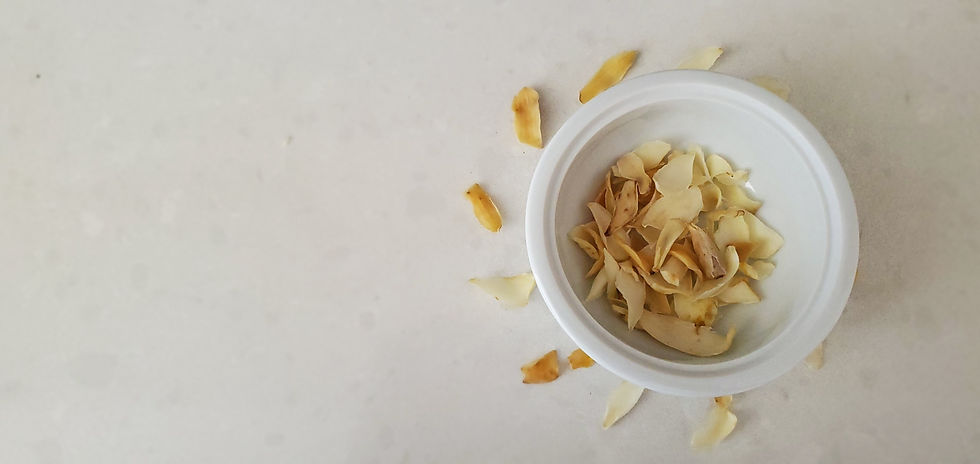Lily bulb, one of the best ideas you will have!
- San Living Team

- Apr 25, 2020
- 2 min read
The lily bulb (bulbus lilii) or "百合" (Bǎi Hé) in Chinese is one of the signs of a blissful marriage in Traditional Chinese Medicine and one of the most commonly used herbs for it as well. Known to calm your mind and spirit, it is also known to relieve coughing through moistening your lung. Originating from Asia, nowadays you can get it anywhere in the world even fresh ones. In Traditional Chinese Medicine, it is supposed to balance the energy in your heart and lung. It is a "cold" natured ingredient so it helps with people who have too much "heat" in their body due to possible reasons such as too much fried foods or not enough sleep. Furthermore, it is a sweet ingredient which in Traditional Chinese Medicine attributes to better reactions and detoxing of your body.Nourishing the lung and yin, it assists in helping with alleviating nightmares as well. It is very popular throughout Asia in countries especially Japan and Korea outside of China.

The taste if fresh is sweet and quite crispy and great for all seasons while usually being an extremely attractive flowering plant. The Roman Catholic Church views the Lily as a symbol of the Virgin Mary, and representing independence and prosperity. This is in comparison to Chinese weddings, where lily bulbs are often used in wedding foods for good luck and longevity. There are three main components are phenols, saponins, and alkaloids which comprise the vast majority of its' health benefits. While your spirt is supposedly alleviated and offers more vitality to yourself.
In terms of food they usually are either dry or fresh with both working great whenever. Primarily they are used in vegetarian dishes and as a flavour enhancer in various dishes. With a fruity and flowery flavour, this is such a great accent on vegetables especially in Chinese styled dishes. It is also used consistently with other herbs especially in Traditional medicine means. It is such an amazing herb but its ability in various medicinal formats can include:
-Alleviating bronchitis
-Alleviating asthma or pharyngitis issues
-Alleviating irritability, nervousness, anxiety, insomnia
-Better Sleep
-Treating low grade fevers
-Aiding with heart palpitations
-Aiding with diarrhea issues
-Increasing concentration
-Good source of calcium, folate, potassium, iron and phosphorus
-Vitamins B1,B2 and C
We love the taste of these with lily bulbs due to their amazing flavour especially considering the lack of options for vegetarian dishes in comparison to meat dishes. These add a different dimension along with some great medicinal properties as well! Unfortunately, lily bulbs may have side effects if consumed regularly or in abundance, so we recommend you consult if you plan on having it regularly. But regardless, we hope you try this beautiful and healthy herb with us on this weeks' ingredient.
-Sincerely your San Living team!
Some research includes:
1.OK Kwon, MY Lee, JE Yuk, SR Oh; et al (2010). Anti-inflammatory effects of methanol extracts of the root of Lilium lancifolium on LPS-stimulated Raw264.7 cells. Journal of Ethnopharmacology. Volume 130, Issue 1, Pages 28-34
Chia, Xiansu & Wang, Shijun & Baloch, Zulqarnain & Zhang, Hongxiu & Li, Xiuyang & Zhang, Zhe & Zhang, Huiling & Dong, Zhenfei & Lu, Yan & Yu, Huayun. (2019). Research progress on classical traditional Chinese medicine formula Lily Bulb and Rehmannia Decoction in the treatment of depression. Biomedicine & Pharmacotherapy.




Comments